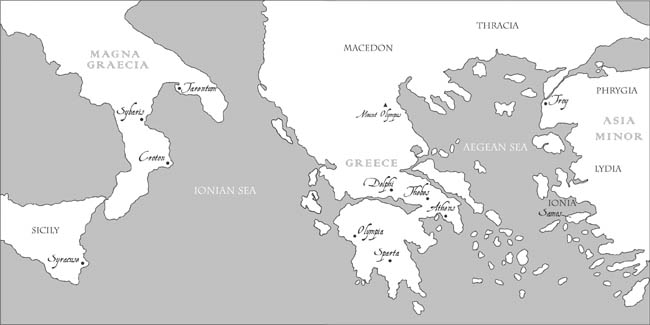Prologue
Pythagoras of Samos, the first man to call himself a philosopher—literally, a lover of wisdom—was a dominant figure in the history of ancient Greece. A brilliant mathematician and a mystic thinker, spiritual teacher, and political theorist, he embodies the intellectualism that was later to pervade classical Greek thought. The greatest Greek minds, from Aristotle to Proclus, all agree that he is the one who raised mathematics to the rank of a science.
But other, more obscure aspects of his personality cast some doubts on the true nature of the personage, such as his belief in the transmigration of the soul from humans to animals, his claim to divine status, and his alleged recollection of his previous reincarnations.
Pythagoras was born on the island of Samos, in the Aegean Sea, around 570 BC. As a young man he traveled to Egypt, where he was taught by the priests of Amon, the human-headed god of Thebes whose home was the temple of Karnak. He is also said to have met the naked philosophers of India before going to Babylon to study and teach astronomy, mathematics, and astrology.
When he was about forty years old he left Samos to escape the rule of the tyrant Polycrates and went to Magna Graecia, or Greater Greece, the name given to a group of Greek cities along the eastern coast of southern Italy. There he settled in the city of Croton, where he founded an ascetic and secretive sect. The fraternity, as their followers called it, was both a religious community and a scientific school devoted to exploring the mysteries of number, “the source and the root of all things.”
For the Pythagoreans, “number” was a living reality whose nature was to be discovered. Their study of number was divided into four branches: Arithmetic, number in itself; Geometry, number in space; Music or Harmonics, number in time; and Astronomy, number in space and time. They believed that only through numbers may we achieve comprehension of things that would otherwise remain unknown; and that it is not only in all aspects of nature that we may see the manifestation of number but also in the creations of art and music.
Music played a central role in the Pythagorean doctrine. Pythagoras’ discovery that harmonious sounds correspond to simple numerical proportions led him to extend this connection to the order of the universe at large and state that “the whole heaven or visible universe is a musical scale or number.” He soothed the passions of the soul and body with the music of the lyre, by playing certain rhythms and singing certain songs that he composed.
Pythagoras taught the immortality of the soul, and that after death the soul transmigrates into other animated bodies. For this reason, all animated beings should be considered as belonging to one great family. He also taught that after certain specified periods the same events occur again, for nothing is entirely new; and that man is a microcosm, reflecting all the elements that make up the universe. He was the first to apply the word kosmos (literally, ordered-world) to the universe. But kosmos also means “ornament,” so that according to Pythagoras the world is adorned with order.
Most of what we know about Pythagoras is shrouded in mystery, a mixture of fact and legend transmitted to us largely through the writings of Greek historians centuries after his time, since the earliest and most reliable accounts have for the most part been lost. These various sources often differ and sometimes openly contradict each other, as on the cause of his death: some say he died in a fire in Croton, others report that he survived the fire and fled to Metapontum, where he died of old age; according to yet another version, he was murdered by an angry mob. On one point, though, all ancient and modern historians agree: Pythagoras left no writings.
But what if he had? What if he had left a manuscript so well hidden that it was never found? Then, a flurry of questions would rush to mind: What was the manuscript about? Why did he write it? And why did he take such extraordinary precautions to preserve it?

